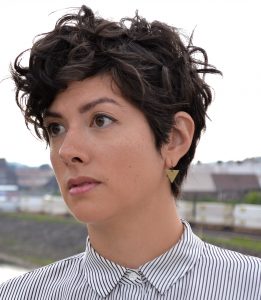RUNNER UP – THE 2019 SANDY CRIMMINS
NATIONAL PRIZE IN POETRY
How to Read Whitewater in the Mid-Atlantic Region
by Kimberly Andrews

Here’s the gift, the undetermined, toothy space in which it bubbles
up crazily, thrashing around and telling you incessantly about
the nature of possibility: these terrible courtships, in other words,
you’ve had with rivers, their greenish syntax letting all the silk
slip to the floor. Susquehanna, Lehigh, Youghigheny, their stolen
clauses, the low trees trailing their fingers as if to say there now
river, there now. And in the little canoe, you sound out each line
in turn. This is the side of you that is full of eagles. The story
unfolds in several keenly observed parts: eddies in their indecision.
Standing waves like stacks of letters, each signed fondly.
Undercut rocks against which the water boils low and smooth,
dangerous in the same way that simplicity is dangerous—
You read for answers because the painted ceiling above you
demands a key to its own reflection. You read for the sluice
because you are normal: you ask for directions, you are
standard in that finally, you favor the tongue harbored between
the wide-set molars, the sunlight bouncing off of a body
shaped like allowance, like the valleys you dare to call your home.
Kimberly Quiogue Andrews is a poet and literary critic. She is also the author of A Brief History of Fruit, winner of the 2018 Akron Prize for Poetry and forthcoming from the University of Akron Press, and BETWEEN, winner of the 2017 New Women’s Voices Prize from Finishing Line Press. She lives in Maryland and teaches at Washington College, and you can find her on Twitter at @kqandrews.